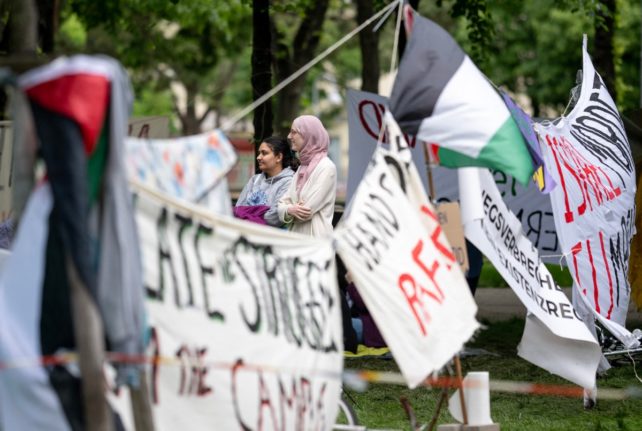Austrian Airlines and workers reach deal averting strikes
Austrian Airlines (AUA) and its unions have reached a new collective labour agreement, avoiding further disruptions for passengers. The deal, reached after extensive negotiations, covers roughly 3,500 pilots and flight attendants and extends until the end of 2026.
The agreement includes a significant pay raise, with salaries increasing an average of 19.4 percent in stages by the end of 2026. Based on company performance, an additional 2 percent raise is also possible in 2026.
The deal also addresses workload concerns and offers improved protection for pilots at risk of losing their licenses due to medical reasons.
“This agreement delivers a substantial salary increase above inflation for AUA cabin crew,” said Daniel Liebhart, head of the aviation division for the vida union.
To ensure stability, both sides have agreed to a “peace obligation,” meaning no strikes will occur until the contract expires in late 2026. “With the first-ever peace obligation, our passengers can once again rely on us,” said AUA’s Executive Board, expressing satisfaction with the outcome.
Austria is the third country with the highest tax burden in the OECD
Austria remains saddled with the third-highest tax and contribution burden among OECD countries, according to the latest “Taxing Wages” study.
The “tax wedge,” which measures the gap between an employer’s labour cost and an employee’s take-home pay after taxes and contributions, is 47.2 percent in Austria for an average single worker. This is significantly higher than the OECD average of 34.8 percent.
While the wedge has risen slightly from 2022 (46.9%), the picture has improved somewhat for families. Austria ranks 11th for married couples with two children on one income (32.8% tax wedge), which is still well above the OECD average (25.7%).
Can I get unemployment benefits in Austria if I’m self-employed?
If you work in Austria as a freelancer or self-employed person, it may be confusing to understand your rights, especially when it comes to unemployment benefits.
Amnesty International calls for action on Human Rights in Austria
Amnesty International (AI) slammed Austria’s human rights record in its annual report. The organisation identified shortcomings in protecting women, supporting refugees, and ensuring press freedom.
AI Austria head Shoura Hashemi called the upcoming election a “fateful year” and urged parties to focus on human rights. The report criticises Austria’s “porous social safety net” and lack of support for refugees and Ukrainians.
AI fears unaccompanied children disappear due to inadequate care. It also demands a national plan to tackle violence against women and calls for measures to protect journalists.
The report criticises police actions at protests and the banning of a pro-Palestine demonstration. It also highlights a rise in hate crimes and insufficient climate action. Finally, AI raises concerns about conditions in detention centres.
Social Democrats maintain a stronghold in the Chamber of Labour elections
Austria’s workers representation body, the Chamber of Labour (AK), which helps almost four million employed people in the country, is going through a major election process for their state representatives. Almost all employees in Austria who are not self-employed are automatically members of the AK and therefore entitled to vote. The elections take place every five years in a process similar to the voting for National Council.
The results of the Chamber of Labour (AK) elections in the eastern region confirm the Social Democratic trade unionists (FSG) as the leading force. Despite this victory, President Renate Anderl faced a setback, as her list in Vienna decreased by 3.2 percentage points.
While the FSG experienced moderate losses in Burgenland, they extended their lead in Lower Austria. The outcome in Vienna is particularly significant, as the winner typically assumes the presidency of the Federal Chamber of Labour.
Although the FSG lost some ground, they remained dominant with 57.5 percent of the vote. The liberal Labour Party secured second place despite a slight drop, while the Christian Trade Unionists and other rival groups experienced losses.
Left-leaning factions saw gains, possibly foreshadowing trends for the upcoming National Council elections. The voter turnout in Vienna was 40 percent, with concerns raised about engaging diverse communities and first-time voters.
FSG national chairman Josef Muchitsch hailed the results as a success, emphasising the need to educate employees about policies detrimental to workers. In Lower Austria, the FSG strengthened their majority under President Markus Wieser.
The FSG maintained a two-thirds majority in Burgenland, although support slightly declined. The elections in Styria are ongoing until April 29th, completing the Chamber of Labour elections nationwide.
Absolute poverty increased in Austria
While Austria’s overall poverty rate remained steady in 2023, the number of people living in absolute poverty has increased significantly, according to Statistics Austria.
Despite the proportion of people at risk of poverty or exclusion staying around 17.7 percent, those facing severe deprivation rose.
The most concerning rise is among children and adolescents. This has reignited calls for a basic child benefit scheme to address the issue.
Statistics show a jump from 201,000 people (2.3 percent) in 2022 to 336,000 (3.7 percent) in 2023 who could not afford basic necessities like unexpected expenses or an annual holiday.
Two cases of underage crime hit the news in Austria
Five teenage girls face charges after allegedly robbing four young tourists on vacation in Vienna. The victims, two girls and two boys aged 15 and 16 from Upper Austria were staying in a rented holiday flat. When they arrived, they discovered they needed someone over 20 to sign the rental agreement. They arranged for someone to come through an acquaintance, but instead, a group of girls aged 16 to 20 showed up. The girls allegedly threatened the tourists with a toy gun, kicked them, and stole their valuables before fleeing.
Vienna police quickly apprehended the suspects, who include a 16-year-old Serbian national, a 17-year-old German, an 18-year-old of unknown nationality, a 19-year-old Hungarian, and a 20-year-old Romanian. All have confessed to the robbery.
A 14-year-old boy faces charges after allegedly threatening a group of children in Puchenau with a knife. The incident occurred on Wednesday evening when the suspect, along with another teenager, reportedly threatened four eight-year-old children. One child was pushed and suffered minor injuries. Police were called the following evening and located the four victims. The suspect and his companion initially fled, but officers were able to apprehend them soon after.
The majority of school pupils want a revamp of the Matura exam
Over 41,000 Austrian school pupils face their Matura exams next week, with a new survey revealing mixed feelings. While 60 percent are confident of passing with good preparation, 70 percent believe the current Matura format needs an update.
The biggest worry for students is the Maths exam, with half dreading it. Many respondents (56 percent) want a more spread-out exam schedule, and some even propose reducing the number of subjects or making Maths optional.
Despite the stress, 82 percent found the pre-scientific paper (VWA) a valuable learning experience. However, nearly 90 percent consider it a major source of stress, with some students turning to AI tools like ChatGPT for help. This practice is disapproved of by 40 percent of respondents.
The survey also highlights a gap between school and real life, with only 40 percent feeling prepared and 75 percent expecting to forget most of the crammed information. Many students believe schools should focus more on practical skills and everyday knowledge.
If you have any questions about life in Austria, ideas for articles, or news tips for The Local, you can contact us at news@thelocal.at or leave a comment below.



 Please whitelist us to continue reading.
Please whitelist us to continue reading.
Member comments